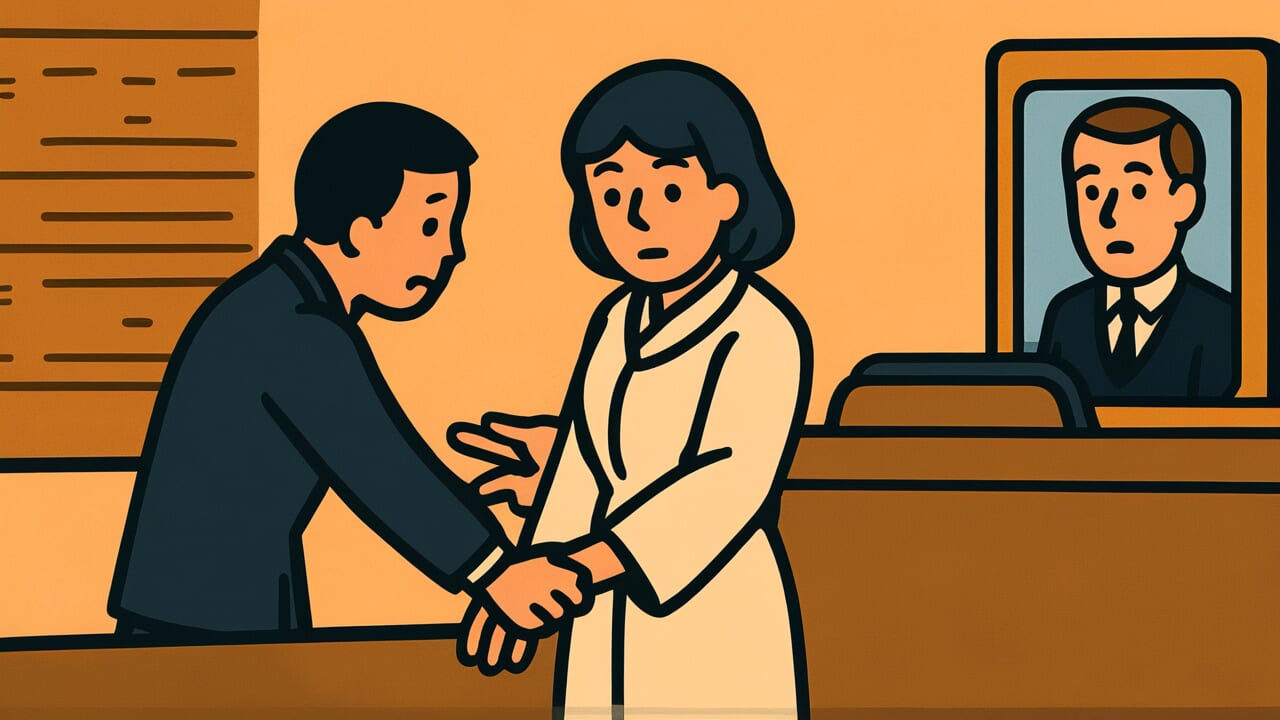How to Read “Even a criminal facing beheading gets a three-day postponement”
Kubi kiru tsumibito ni mo mikka no hinobe ari
Meaning of “Even a criminal facing beheading gets a three-day postponement”
This proverb means that even someone who committed the gravest crime deserves a final grace period. If even a criminal sentenced to beheading gets three days before execution, then people who made lesser mistakes deserve even more time to reflect and explain themselves.
Today, people use this saying when someone wants to punish a mistake too quickly. It carries the message “don’t rush to blame” or “give them some time to think.”
The proverb teaches the importance of staying calm when judging others. It reminds us to give people minimum consideration, even if we don’t fully forgive them.
This saying balances strictness with kindness. It shows that basic human decency should never be forgotten, even when dealing with serious wrongdoing.
Origin and Etymology
The exact origin of this proverb is unclear, but it likely comes from the Edo period punishment system. Even criminals sentenced to death received time between judgment and execution.
This wasn’t just bureaucratic procedure. It was a humane consideration that let criminals prepare mentally, say goodbye to family, and settle their affairs.
The “three days” mentioned doesn’t necessarily refer to an actual legal waiting period. It means “even a brief period” should be granted.
The idea was that even the worst criminals deserved a few days before facing their final moment.
Buddhist thought influenced this practice. Giving criminals time to repent and prepare their hearts offered a chance for salvation in the next life.
Confucian values of “benevolence” also played a role. This meant showing basic compassion as a human being.
Even within a strict punishment system, Japanese culture didn’t completely strip away human dignity. This proverb reflects Japanese views on life and death.
Usage Examples
- Seeing a boss furious at a subordinate’s mistake, I reminded him that even a criminal facing beheading gets a three-day postponement, so hearing the full story first wouldn’t hurt
- Instead of immediately confiscating my son’s game console for bad grades, I remembered that even a criminal facing beheading gets a three-day postponement, so I decided to talk with him first
Universal Wisdom
This proverb has endured because it captures two opposing human instincts perfectly. One is the sense of justice that wants to hate evil and punish it immediately.
The other is the compassionate heart that wants to recognize dignity in every person, even at the very end.
When driven by anger, people want to completely deny the other person and give no grace period. This comes from a natural sense of justice.
But humans also have a “still though” feeling. Even toward someone we hate, we hesitate to treat them as less than human. We resist crossing that final line.
This conflict exists across all eras. When we stand in judgment of others, we must also face our own humanity.
How we treat others actually reflects who we want to be as people.
Our ancestors understood something important. There are no completely evil people in this world, and no completely good people either.
That’s why even when imposing the harshest punishment, granting a brief grace period lets both judge and judged remain human.
This wisdom might be the last fortress that keeps humans human.
When AI Hears This
The three-day postponement actually functions as a “self-restraint device” preventing rulers from running wild. In game theory, when you can’t trust your future self, limiting your options strategically produces rational results.
It’s like dieters not keeping snacks at home.
Rulers have the power to execute someone immediately in anger. But doing so risks regret later when they calm down.
More importantly, repeatedly making emotional judgments spreads the reputation that “this ruler kills people based on mood.” This collapses trust in the entire legal system.
Short-term emotional satisfaction trades off against long-term governance stability.
The three-day postponement becomes a forced mechanism where rulers delegate judgment to their “future calm self.” The key is that this isn’t just recommended—it’s institutionalized.
Making it a system forces delayed execution even when furious in the moment.
Behavioral economics research shows people overvalue immediate rewards and undervalue future benefits. The three-day cooling period systematically corrects this cognitive bias.
Here’s the paradox: what looks like mercy is actually a rational self-defense strategy for maintaining power.
Lessons for Today
This proverb teaches modern people the value of “the power to wait.” In an age where we react instantly on social media and judge immediately, this wisdom shines brighter than ever.
When you spot someone’s mistake, wait overnight before posting that critical comment—not three days, but at least one night. When a subordinate fails, don’t scold them on the spot. First, make time to hear their side.
When your child breaks a promise, don’t punish emotionally. Try to understand why it happened.
These small acts of “waiting” can transform relationships dramatically.
Waiting isn’t weakness. It’s the strength to control your emotions and respect the other person’s humanity.
When you give someone a grace period, you’re actually giving yourself time to make a better judgment too.
Most importantly, you’re building relationships where others will grant you the same grace when you make mistakes. Tolerance comes full circle and becomes the power that saves you.



Comments